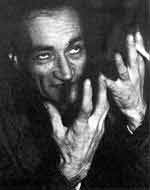Antonin Artaud
"I do not consider any work apart from life"
Antonin Artaud has been described as a philosopher, playwrite, visionary, poet, madman, opium addict,
surrealist, genius... Having recently read his collected works I find myself salient with thoughts of him, a
man who saw the future of theatre, who fought off financial constraints and contempt by his colleagues
and whose ideas still infiltrate the arts today.
Many critics and biographers of Artaud have based much of their work on his drug addiction, his madness,
the miseries that forced his mind. They appreciate his work as genius, but focus on the affliction as a living
thing within itself, with its own pulse. His mental sickness did not draw him to the depths of hell. It served
to heighten his egoistic plenitude, his ability to look within. To quote Bettina Knapp, author of 'Antonin
Artaud: Man of Vision':
"...he succeeds in contacting the most primitive elements from within himself and within all men: the Beginning, Chaos, the Abyss - the source of all creation - Reality."
Every form of expression he used within his career - from written scenarios to characters in film and poetry - were himself in transmigration. As an actor he chose the characters most like his own personality, in order to fulfil his search for an understanding of the mind. Stage life for Artaud was simply a continuation of 'real' life, with his performances turning to the realm of metaphysics.
Artaud began by writing poetry, but became depressed by his failure to find the right words. Poetry could not get to the core of his degradation, his sickness, his diseased mind. He began to float, buoyant, on a quest to make physical the emotional, driven by the knowledge that words do not convey essence, only bare meaning. He saw words as a pattern of hieroglyphs used more to create sound than freedom.
And so, after a brief perod with the Surrealists and a final clash with Andre Breton, Artaud formed the Alfred Jarry Theatre. Jarry, a playwrite as famous for his eccentricities as for his Rabelaisian playlet 'Ubu Roi', touched a chord with Artaud, especially in his writing about anything and everything that interested him and injecting into it an almost caustic wit. This was a stepping-stone, but not an easy time for Artaud. No money was made from the few performances he cast, he and the actors had no base and could afford to perform only one night at a time in the few theatres that opened their doors to them, and often the audience were ignorant or plainly revolted by what they saw.
The Alfred Jarry Theatre was aborted and Artaud moved briefly into silent film, known best as Brother Masieur in the 1928 version of Jeanne d'Arc and as Marat in Napolean. And then he witnessed something that would forever change his life and his art. In 1931 he saw a performance by the Balinese Theatre and wrote of their use of dance, mime, sound, lighting, puppets, and of the significant absence of words:
"Here we are suddenly in the thick of a metaphysical struggle and the rigid aspect of the body in a trance, tensed by the surging of the cosmic powers attacking it, is admirably expressed in that frenzied dance full of angular stiffness, where we suddenly feel the mind's headlong fall begins."
Artaud was transformed and so began his fevered writings and productions in the form of the Balinese. So impressed was he by the Oriental theatre, its plays and its players, its synesthesia of expression, the ability to hear the lights and see the sound, and the forming of a language without words, that he founded the Theatre of Cruelty.
With his renouncement of structured language, Artaud took the French theatre of his day to new heights. His productions aimed not at intellect but at the heart of emotion. It was taken beyond mere acting. He injected something sinister, something cruel and darkly humorous. Artaud turned the most tragic stories into a carnival in order to create a true meaning.

